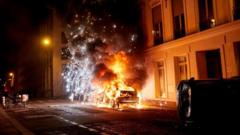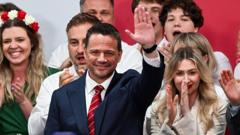Ecuador's current administration faces pressing challenges in addressing gang violence and economic stability.
Ecuador's President Noboa Secures Re-Election Amid Controversy

Ecuador's President Noboa Secures Re-Election Amid Controversy
Noboa's victory amidst claims of electoral fraud signals a divided nation.
In a significant political development, Ecuador's President Daniel Noboa has successfully secured re-election, affirming his leadership for a full four-year term. His triumph in the run-off election, where he garnered approximately 56% of the vote, has been characterized as "historic." Having only taken office in November 2023 following a snap election, Noboa's presidency has been heavily marked by a rigorous military offensive against the nation's violent criminal gangs, which have propelled Ecuador into becoming one of the most dangerous countries in South America.
His leftist rival, Luisa González, has rejected the election results, alleging fraud without presenting supporting evidence, raising questions regarding the electoral process. Following the announcement of the results, Noboa emphasized the significance of his victory, noting it represented a clear mandate with over a million votes separating him from González.
Noboa's administration is positioned to advance its "war" on drug gangs, which has included implementing military operations throughout the streets and prisons in the country. He is also advocating for constitutional amendments that would permit foreign military bases, a move not seen since Rafael Correa’s presidency, the very figure who has influenced González's political stance.
Despite a minor reduction in homicide rates during his time in office, severe violent crime levels persist, underscoring the urgency for Noboa to demonstrate the effectiveness of his security strategies to mitigate public dissent. Economic issues, especially unemployment exacerbated by recent droughts and energy crises, remain high on the agenda, leading Noboa to propose increased investments in renewable energy.
Further complicating his term, Noboa's recent tariffs on Mexican imports and the revocation of amnesty for Venezuelan migrants indicate a shift in foreign relations, particularly with the United States. His campaign, notably targeted at the youth demographic, focused on job creation and infrastructure advancements while tackling corruption.
González’s supporters express sentiments of nostalgia for the Correa era, a reflection of the existing polarization within Ecuador's political landscape. This division presents significant challenges for Noboa as he moves forward in his administration, aiming to foster unity in a country marked by discord and political tension.
His leftist rival, Luisa González, has rejected the election results, alleging fraud without presenting supporting evidence, raising questions regarding the electoral process. Following the announcement of the results, Noboa emphasized the significance of his victory, noting it represented a clear mandate with over a million votes separating him from González.
Noboa's administration is positioned to advance its "war" on drug gangs, which has included implementing military operations throughout the streets and prisons in the country. He is also advocating for constitutional amendments that would permit foreign military bases, a move not seen since Rafael Correa’s presidency, the very figure who has influenced González's political stance.
Despite a minor reduction in homicide rates during his time in office, severe violent crime levels persist, underscoring the urgency for Noboa to demonstrate the effectiveness of his security strategies to mitigate public dissent. Economic issues, especially unemployment exacerbated by recent droughts and energy crises, remain high on the agenda, leading Noboa to propose increased investments in renewable energy.
Further complicating his term, Noboa's recent tariffs on Mexican imports and the revocation of amnesty for Venezuelan migrants indicate a shift in foreign relations, particularly with the United States. His campaign, notably targeted at the youth demographic, focused on job creation and infrastructure advancements while tackling corruption.
González’s supporters express sentiments of nostalgia for the Correa era, a reflection of the existing polarization within Ecuador's political landscape. This division presents significant challenges for Noboa as he moves forward in his administration, aiming to foster unity in a country marked by discord and political tension.






















